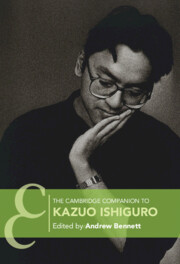Book contents
- The Cambridge Companion to Kazuo Ishiguro
- The Cambridge Companion to Kazuo Ishiguro
- Copyright page
- Contents
- Figures
- Contributors
- Acknowledgements
- Chronology
- Abbreviations
- Introduction
- Part I Kazuo Ishiguro in the World
- Part II Literature, Music, and Film
- Part III Ethics, Affect, Agency, and Memory
- 12 Ethics and Agency in Ishiguro’s Novels
- 13 ‘Emotional Upheaval’ in An Artist of the Floating World and The Buried Giant
- 14 Ishiguro and Love
- 15 Memory and Understanding in Ishiguro
- 16 Ishiguro’s Irresolution
- Guide to Further Reading
- Index
- Cambridge Companions To …
15 - Memory and Understanding in Ishiguro
from Part III - Ethics, Affect, Agency, and Memory
Published online by Cambridge University Press: 16 March 2023
- The Cambridge Companion to Kazuo Ishiguro
- The Cambridge Companion to Kazuo Ishiguro
- Copyright page
- Contents
- Figures
- Contributors
- Acknowledgements
- Chronology
- Abbreviations
- Introduction
- Part I Kazuo Ishiguro in the World
- Part II Literature, Music, and Film
- Part III Ethics, Affect, Agency, and Memory
- 12 Ethics and Agency in Ishiguro’s Novels
- 13 ‘Emotional Upheaval’ in An Artist of the Floating World and The Buried Giant
- 14 Ishiguro and Love
- 15 Memory and Understanding in Ishiguro
- 16 Ishiguro’s Irresolution
- Guide to Further Reading
- Index
- Cambridge Companions To …
Summary
When Never Let Me Go was published in 2005, Ishiguro indicated that he ‘remain[ed] fascinated by memory’, and that his next challenge was to examine the themes of national memory and forgetting. The Buried Giant, published in 2015, represents Ishiguro’s unique meditations on collective memory, understanding, and the complexities of forgetting. Utilizing a third-person narrative voice, Ishiguro orchestrates a post-Arthurian landscape of buried slaughter and collective amnesia, whilst engaging in a critical enquiry into the nature of shared memories in relationships. This chapter will begin by considering Ishiguro’s memory work in his earlier novels, before an investigation into the fallibility of memory and understanding precipitated by the enigmatic mist. This is followed by an exploration of the question of culpability and the complexities of collective memory. The chapter concludes by reflecting on the figure of the boatman, the island of forgetting, and the implications of an enforced forgetting.
- Type
- Chapter
- Information
- The Cambridge Companion to Kazuo Ishiguro , pp. 226 - 239Publisher: Cambridge University PressPrint publication year: 2023
- 1
- Cited by

